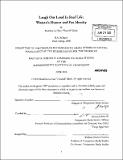| dc.contributor.advisor | Henry Jenkins III. | en_US |
| dc.contributor.author | Klink, Madeline LeNore | en_US |
| dc.contributor.other | Massachusetts Institute of Technology. Dept. of Comparative Media Studies. | en_US |
| dc.date.accessioned | 2010-10-29T18:25:19Z | |
| dc.date.available | 2010-10-29T18:25:19Z | |
| dc.date.copyright | 2010 | en_US |
| dc.date.issued | 2010 | en_US |
| dc.identifier.uri | http://hdl.handle.net/1721.1/59730 | |
| dc.description | Thesis (S.M.)--Massachusetts Institute of Technology, Dept. of Comparative Media Studies, 2010. | en_US |
| dc.description | Cataloged from PDF version of thesis. | en_US |
| dc.description | Includes bibliographical references (p. 83-91). | en_US |
| dc.description.abstract | The emerging field of fan studies has, until recently, been defined only by the research that has taken place within it. Almost universally, this research focuses on self-identified fans. However, scholars are beginning to examine and debate what the limits of the field should be. This study argues that self-identified fans are not the only group that ought to be examined under the heading of fan studies. It also highlights the fact that humor is rarely discussed in fan studies, and argues that this is a major lacuna. In order to accomplish these goals, this study turns to three examples. The first example is an online discussion community for the Twilight novels, Twatlight, which does not define itself as a fan community but nevertheless exhibits all the characteristics of a fan community and is in conversation with self-identified fan communities. The second example is humorous images produced by the Twatlight community, which use jokes to make serious arguments about the Twilight books. The third example is humorous fan vids produced within the mainstream media fandom vidding community; fan vids have been traditionally treated by fan studies as purely melodramatic artworks. The study concludes that fan studies should define itself as the study of people who are affectively engaged with texts in the context of critical communities. | en_US |
| dc.description.statementofresponsibility | by Madeline LeNore "Flourish" Klink. | en_US |
| dc.format.extent | 91 p. | en_US |
| dc.language.iso | eng | en_US |
| dc.publisher | Massachusetts Institute of Technology | en_US |
| dc.rights | M.I.T. theses are protected by
copyright. They may be viewed from this source for any purpose, but
reproduction or distribution in any format is prohibited without written
permission. See provided URL for inquiries about permission. | en_US |
| dc.rights.uri | http://dspace.mit.edu/handle/1721.1/7582 | en_US |
| dc.subject | Comparative Media Studies. | en_US |
| dc.title | Laugh out loud in real life : women's humor and fan identity | en_US |
| dc.title.alternative | Women's humor and fan identity | en_US |
| dc.type | Thesis | en_US |
| dc.description.degree | S.M. | en_US |
| dc.contributor.department | Massachusetts Institute of Technology. Program in Comparative Media Studies/Writing | |
| dc.identifier.oclc | 670228120 | en_US |
